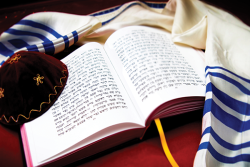Evolving Justice
I was recently called to jury service in Los Angeles. As imperfect as this complicated, human system of law may be, the jury selection made me proud to be an American, especially as the judge instructed the potential jurors about the meaning of “presumed innocent.”
Morality in War, Then and Now
We begin our parashah in the fortieth, and thus, final year of Israel's desert trek toward the Promised Land. The people are encamped on the eastern side of the Jordan River, opposite Jericho.
Preaching on the Haftarah and Reassessing Tishah B’Av
Parashat Mas’ei is the concluding reading from the biblical Book of Numbers and is filled with a wealth of historical detail. This year, the Shabbat on which we read Mas’ei comes at the beginning of month of Av.
Destination: D'varim
I must confess that I do not have a great sense of direction. Thankfully, my new GPS offers me three choices of routes every time I enter a destination. In addition, I can customize my route based on whether I want to take highways or wish to avoid busy roads.
The Shaping Power of Words
When a bush aflame with a divine summons called Moses to the redemptive task, he tried to decline the charge with this demurral: "Please, O God, I have never been a man of words, either in times past or now that you have spoken to Your servant..." (Exod.
Hear Them Out
As has been noted by many commentators, the Book of Deuteronomy, Devarim, constitutes a retelling or, perhaps more precisely, a "second telling" of many of the events and much of the teaching encompassed in the forty years of the ancient Israelites' Exodus experience.
Leaving the Desert
The other evening I was checking my e-mail when an "instant message" from a friend in New York popped up on the screen. A few seconds later the telephone rang: It was a friend in Minnesota. Soon after, I received another "instant message" from a colleague in California.
Nothing But Words
Our world is filled with words. We hear them all the time from many different segments of society, including radio and television talk show hosts, friends and neighbors, and politicians. Everyone, it seems, has something to say about one subject or another.

